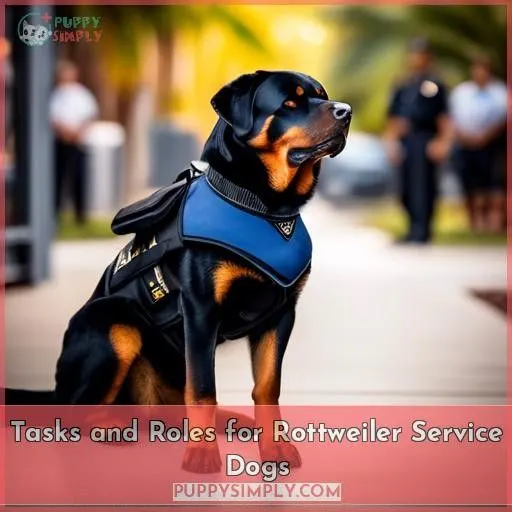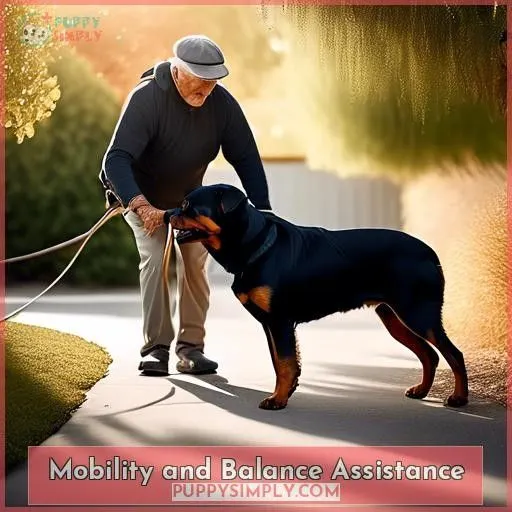This site is supported by our readers. We may earn a commission, at no cost to you, if you purchase through links.
Rottweilers can make excellent service dogs due to their specialized training abilities, protective instincts, and calm demeanor. Their size, strength, and intelligence make them well-suited for tasks like mobility support, object retrieval, and emotional support.
With proper socialization and a strong bond with their handler, Rottweilers excel at public access skills and can provide exceptional service.
However, health considerations like hip dysplasia must be carefully managed. If you’re considering a Rottweiler as a service dog, their versatility and trainability suggest they could be an outstanding choice, but further research into their specific traits and training needs is recommended.
Table Of Contents
- Key Takeaways
- Are Rottweilers Good Service Dogs?
- Service Dog Basics
- Rottweilers’ Suitability for Service Dog Work
- Personality Traits for Service Dogs
- Size Advantages for Service Dogs
- Intelligence and Trainability
- Loyalty and Bonding With Handlers
- Friendliness and Socialization
- Tasks and Roles for Rottweiler Service Dogs
- Mobility and Balance Assistance
- Object Retrieval and Notification
- Frequently Asked Questions (FAQs)
- Conclusion
Key Takeaways
- Rottweilers can make excellent service dogs due to their specialized training abilities, protective instincts, and calm demeanor.
- Their size, strength, and intelligence make them well-suited for tasks like mobility support, object retrieval, and emotional support.
- Proper socialization and a strong bond with their handler are crucial for Rottweilers to excel at public access skills and provide exceptional service.
- Health considerations like hip dysplasia must be carefully managed, and further research into their specific traits and training needs is recommended.
Are Rottweilers Good Service Dogs?
Yes, Rottweilers can make excellent service dogs due to their loving personality, willingness to help their owner, and strong desire to please. They’re part of the working dog breed group and can be trained for tasks such as mobility assistance, retrieving medication, and turning off and on lights.
However, it’s imperative to guarantee proper training and socialization to prevent aggressive tendencies, as Rottweilers were originally bred for guarding.
Service Dog Basics
As a service dog handler, you’re likely to encounter a variety of situations that demand your dog’s assistance. To make sure your Rottweiler is up to the task, it’s vital to provide them with specialized training. This training should include tasks specific to your needs and public access skills, as your dog will need to accompany you in any public setting.
Rottweilers are known for their loyalty and protective nature, making them exceptional companions for individuals with physical disabilities. Their size and strength can provide balance assistance, while their intelligence and trainability enable them to learn complex tasks. However, it’s critical to remember that Rottweilers, like any breed, require proper training and socialization to develop the desired temperament and skills for service work.
To get started, you’ll need a letter from a health professional to qualify for a service dog and undergo an assessment to determine your specific needs. Once you’ve been matched with a suitable Rottweiler, you’ll need to complete training, which may involve adopting a dog through a Rottweiler rescue organization or an ethical breeder.
Throughout the training process, it’s vital to focus on positive reinforcement and socialization to ensure your Rottweiler is well-behaved and able to perform tasks effectively in public settings. With the right training and support, your Rottweiler can become an invaluable companion and assistant, providing physical and mental support when you need it most.
Rottweilers’ Suitability for Service Dog Work
When considering Rottweilers as service dogs, you’re looking at a breed that’s unfairly caught in the crossfire of breed discrimination. Yet, their capabilities are remarkable:
- Task Specialization: Rottweilers excel in advanced training, mastering tasks from mobility support to object retrieval.
- Health Considerations: Despite their strength, be mindful of health issues like hip dysplasia, which can affect service work.
- Emotional Support: Their loyalty makes them exceptional for emotional support, offering a sense of safety and control to those with physical disabilities.
Personality Traits for Service Dogs
Rottweilers possess several personality traits that make them excellent service dogs. They’re known for their calm demeanor, protective instincts, strong work ethic, adaptable nature, and gentle disposition. These traits are vital for service dogs, as they need to remain calm and focused in various situations, protect their handlers, and provide emotional support.
Rottweilers have a natural protective instinct, which is essential for service dogs that assist individuals with physical disabilities. They’re also intelligent and easy to train, making them suitable for various tasks such as object retrieval, deep pressure therapy, and emotional support. Additionally, their loyalty and bonding with handlers are critical for service dogs, as they need to build a strong connection with their handlers to provide the necessary support.
Rottweilers can also be friendly and socialized, which is important for service dogs that interact with the public. They can be trained to be gentle and loving when trained and socialized properly. This friendliness allows them to provide support in various settings, including therapy dogs and psychiatric service dogs.
Size Advantages for Service Dogs
The size of a Rottweiler service dog can be an advantage in various situations. Here are three reasons why:
- Weight and Strength: Rottweilers are known for their muscular build and impressive strength. This can be beneficial in situations where physical support is needed, such as assisting with mobility and balance.
- Presence and Deterrence: Their imposing stature can deter potential dangers, providing an extra layer of safety for their handlers. This is particularly useful for individuals with medical emergency alert needs or those who require a guard dog.
- Training and Versatility: Rottweilers are intelligent and easily trained, making them suitable for a range of roles, from service dogs to police dogs. Their size and strength can be harnessed for tasks like object retrieval and deep pressure therapy, making them versatile companions.
Intelligence and Trainability
Building on the size advantages Rottweilers bring to the service dog arena, their intelligence and trainability truly set them apart. Known for their sharp minds, these former herding dogs excel at learning new commands and tasks with alacrity.
Training them is less of a chore and more of a joy, as they respond enthusiastically to praise and positive reinforcement. This makes one wonder, are Rottweilers good service dogs? Absolutely! Their obedience and ability to quickly grasp complex commands make them standout candidates for various service roles.
Loyalty and Bonding With Handlers
Building a strong connection with your Rottweiler service dog is essential for a thriving partnership. Bonding techniques can assist you in establishing a link with your canine companion, fostering trust and comprehension. Here are some recommendations to improve the bonding process:
- Tethering and Umbilical Training: Spend extended periods together, such as tethering your dog to you, to generate opportunities for practice, training, and interaction.
- Positive Interactions: Engage in activities that foster positive associations between you and your Rottweiler, such as playing, grooming, cuddling, or exploring.
- Clear Communication: Learn your dog’s preferences and respond to their needs, which will enhance your mutual understanding.
- Consistent Training: Employ positive reinforcement and socialization to build a solid foundation for your Rottweiler’s training.
- Trust Exercises: Participate in trust-building activities, such as teaching your Rottweiler to retrieve items or perform tasks, which can strengthen your bond.
- Affectionate Nature: Rottweilers are renowned for their affectionate nature, so ensure you provide ample love and affection to your service dog.
- Emotional Support: As a service dog, your Rottweiler will provide emotional support, so reciprocate by demonstrating love and appreciation.
Friendliness and Socialization
Rottweilers are renowned for their devotion and defensive instincts, making them ideal companions for persons with impairments. However, their reputation as vigorous and possibly aggressive dogs can be deceptive. The secret to guaranteeing a Rottweiler’s affability and integration lies in early education and exposure to diverse settings.
Integration is paramount for Rottweilers, as their socially domineering temperament can make them wary of outsiders and quick to safeguard their possessions. Suitable integration can aid them in becoming more gregarious and less reactive. Education methods that emphasize positive reinforcement and early integration are vital for molding a Rottweiler’s nature and conduct.
While Rottweilers may have a repute for aggression, this is frequently attributable to a lack of adequate education and integration. With appropriate direction, they can evolve into affectionate and mild companions. It’s crucial to bear in mind that individual temperaments can fluctuate, and not all Rottweilers will exhibit the same personality attributes.
Tasks and Roles for Rottweiler Service Dogs
Rottweilers as Service Dogs: Tasks and Roles
Rottweilers make excellent service dogs due to their loyalty, intelligence, and trainability. Here are some of the tasks and roles they can perform:
- Emotional Support: Rottweilers can provide comfort and companionship to individuals with mental health issues, such as PTSD.
- Psychiatric Assistance: They can help individuals with anxiety or depression by providing a calming presence and performing tasks like deep pressure therapy.
- Medical Detection: Rottweilers can be trained to detect changes in their handler’s body chemistry, alerting them to potential medical issues.
- Social Skills: These dogs can help their handlers navigate social situations, acting as a barrier or providing a sense of security.
Mobility and Balance Assistance
As a Rottweiler service dog, you’ll be trained to provide mobility and balance assistance. This means you’ll be harnessed and taught leash control to help guide your handler’s wheelchair or provide extra support.
Balance exercises will be part of your training to make sure you can assist with stability. Building confidence is essential, as you’ll need to be calm and focused in public settings.
Together, these skills will make a significant difference in your handler’s life.
Object Retrieval and Notification
Building on their knack for mobility and balance assistance, Rottweilers excel in object handling and alerting behaviors, making them indispensable companions. Their scent detection and tracking skills are exceptional, enabling them to retrieve items or notify you of unusual activities with uncanny accuracy. Imagine having a furry detective by your side, always on the lookout.
Their emergency response capabilities can be a real game-changer, ensuring you’re never alone in a pinch. It’s like having your own personal bodyguard with an acute sense for safety.
Frequently Asked Questions (FAQs)
What is the average lifespan of a Rottweiler service dog?
The Rottweiler’s lifespan, like a finely tuned timepiece, typically spans 8 to 10 years. These steadfast companions are built to serve, their loyal hearts beating strong for the duration of their watchful tenure.
Can Rottweilers be trained for emotional support?
Rottweilers can make excellent emotional support animals with the right training. Their loyalty, protectiveness, and comforting presence make them well-suited to provide the emotional support you need. Just be sure to socialize them thoroughly.
How do Rottweilers perform in public settings?
With focused training, Rottweilers can excel as service dogs, guiding their handlers seamlessly through public settings. Their innate intelligence and loyalty make them steadfast companions, offering reliable assistance when their handler needs it most.
What is the process of adopting a Rottweiler service dog?
To obtain a Rottweiler service dog, you’ll require a certified professional’s recommendation, an evaluation, and instruction. Acquire your furry partner from a trustworthy rescue organization or breeder to guarantee its readiness to become your steadfast companion.
Are there any breed-specific challenges in training Rottweilers?
Rottweilers’ headstrong nature and protective instinct can make ’em challenging to train as service dogs. But with abundant patience and customized techniques, you can fully unleash their formidable capacity to serve as unwavering companions.
Conclusion
Certainly, crafting capable Rottweiler service dogs demands diligent dedication. Carefully cultivating their specialized training capabilities, protective instincts, and calm demeanor is essential.
Mindful of health concerns like hip dysplasia, prospective handlers must thoughtfully consider if a Rottweiler is the most suitable service dog for their needs.
With proper socialization and a strong bond, these impressive pups can excel at public access and provide exceptional service. Ultimately, Rottweilers may prove an exceptional service dog choice, but thorough research is strongly recommended.

















